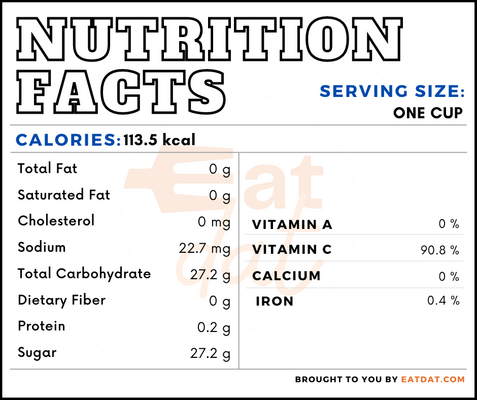
Raisin Juice
What is Raisin Juice?
Raisin juice is the liquid concentrate extracted from raisins. Raisins are grapes that are dried and shriveled up. They are usually made from dark large grapes. This juice is often used as a supplement but may also be used in cooking or baking. Also, it is used as a substitute for sugar in some recipes. Raisin juice is different from grape juice because it is highly concentrated and hence, also very sweet.
- The liquid usually has a thick consistency and has a brownish color.
- The word itself comes from the Old French ‘racemose’, which means a cluster of grapes.
Some of the most popular juice brands include:
- POM
- Lakewood
- Suja
- R.W. Knudsen
- Naked
- Santa Cruz Organic
- Bolthouse Farms
- Evolution Fresh
- Simple Truth
- Garden of Flavor
Origin of Raisin Juice
It is likely that the discovery of raisins was made by accident, perhaps when some grapes were left out in the sun to dry. They were used in ancient Egypt in 2000 BC. The cultivation of grapes and wine-making was originally developed by Phoenicians and Armenians and they began trading with Greeks and Romans. It was around this time that raisins were discovered and quickly became popular. The Crusades in the 11th century resulted in them spreading to Europe, from where Spanish conquistadors spread it to the Americas.
Nutrition
Nutritional profile for raisin juice (1 cup):

Percentages are based on a diet of 2000 calories a day.
Raisins contain 60 percent sugar, consumption of which can lead to an array of health problems. However, they are rich in dietary fiber, prebiotic properties, antioxidants, phenolic compounds, and anti-bacterial properties.
Consumption of raisins or raisin juice on a regular basis may help in preventing atherosclerosis, high blood cholesterol, hypertension, diabetes, colon cancer, and dental decay. There is significantly less risk of obesity among consumers. Also, these dry fruits help in combating gastrointestinal diseases.
Commercial production
Turkey is the largest raisin producing country in the world, followed by the United States, Iran, Greece, Chile, South Africa, Uzbekistan, Afghanistan, Australia, and Argentina. Almost 80 percent of the world’s production is by Turkey and United States combined. Raisin juice is usually available only in health stores or in wholesale quantities directly from the producing companies.
Raisins are prepared by drying out grapes by sun drying, shade drying, or mechanical drying method. Sun drying involves just drying out the grapes in the sun. In recent decades, mechanized drying of grapes has become popular because it offers sanitary solutions. Raisin juice is prepared by soaking these dried grapes in water, which leaches several compounds out of them. The resulting liquid is allowed to evaporate to create a concentrate.
Raisin Juice recipes
Raisin juice is mainly used in desserts and baked goods. Also, it may be used as a drizzle or dip for different desserts. Here are a few recipes.
FDA regulations
Raisins fall under the category of dried/dehydrated fruit and vegetable products. The USDA sets the standards and grades for them, which specify the moisture content in different grades affecting their quality. Any fruit juice, including raisin juice, is described as a carbonated or noncarbonated beverage that contains less than 100 percent and more than 0 percent fruit or vegetable juice.
References
Global Raisin Juice Market by Type (Thiamine, Niacin, Folate, Vitamin B6, Vitamin B12), By Application (Flavoring Agent, Sweetener, Texturizing Agent, Preservative) And By Region (North America, Latin America, Europe, Asia Pacific and Middle East & Africa), Forecast From 2022 To 2030; Report ID: 90895; DataIntelo, https://dataintelo.com/report/raisin-juice-market/
Ajay Kumar Sharma, National Research Centre for Grapes Pune, Grape Drying – A Process of Value Addition in Grapes, Krishisewa, https://www.krishisewa.com/pht/255-grape-drying.html
Olmo-Cunillera, Alexandra et al. “Is Eating Raisins Healthy?.” Nutrients vol. 12,1 54. 24 Dec. 2019, doi:10.3390/nu12010054, https://www.ncbi.nlm.nih.gov/pmc/articles/PMC7019280/
